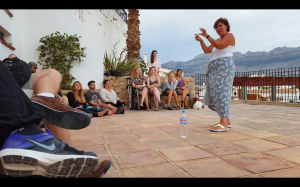Reflection on Week 1 of EDGE Project 2015 by Tober Corrigan
One week into Edge project and our time here has been dominated by stories. We’ve been asked to share how we got to Altea, how we became Christians, how our parents met, and even about those generations so far back we could have only heard about them. We’ve begun to hear stories from the people of Altea too. Café, restaurant, and jewelry storeowners are only too quick to tell the story of their grand idea for their establishments, which, for one reason or another, never really translated into reality. The peasant lady tells us immediately after our asking how she became poor; the widower speaks to us of the agonizing loneliness of her day-to-day life. Not all stories we learn in Altea are joyous ones. Neither necessarily are the stories from those of EDGE 2015. Through conversation, I have learned that all of us here at EDGE are carrying narratives heavier than any checked luggage we brought along the way. Whether surprising or not, it is tragedy that I found to be a most dominant through line in the stories shared the first few days.
There are stories of watching relatives spending their final, pain-riddled moments on earth. There are fathers who have abandoned sons, husbands who have lusted after the flesh of their neighbors’ wives, and extended family and friends who have chosen drink or the needle as their masters. As unpleasant and as harrowing as these stories are, there exists a part of us that loves to share them. Whether we consciously recognize it or not, we are fixated by the tragic nature of our own lives, and the same with the sins of our forefathers. In giving the snapshots of our family history this past Thursday, how quick we were to skip over the story of the perpetually meek, perpetually mild great-aunt from Pensacola who carried her life with a quiet, uneventful dignity, so that we could instead mention the divorce of our parents, the affair our grandfather had for years that no one knew about, or the suicide of a great-grandmother over a grief turned frostbitten from too many years left out in the cold. The most tragic parts of our lives are often the first that come to mind.
Consider how many hours of books and movies we consume simply on the premise that it will offer us the potential for tragedy: an affair, a murder, a government conspiracy, or even a villainous plot to destroy the world. We love a good page-turning mystery or a good episode of CSI, not just because we like to play detective in a game of no-stakes make believe, but because we are secretly fascinated with the gruesome, gory, unnatural details of the case driving the mystery. Reality television only exists because of conflict, of drama, of the great spectacle that only the potential for warfare and calamity can cause: Achilles and Hector fighting to the death on our television screens, only this time in street clothes and Hollywood smiles. And this is only the more superficial of examples. In our everyday lives, how much more inclined we are to share the story of the car accident that almost killed us than of the story of the car ride to our grandparents’ house with our father, where we listened to Neil Diamond’s “Kentucky Woman” and laughed and swapped our ideas of who we thought God was. How much more invested we are in one’s personal testimony if it involves a horrific chain of events that almost lead the subject to their demise than if it is of a more subtle and less shocking conversion.
We love real life tragedy because of how almost miraculous it is that humanity can be so corrupt and depraved and inhumane. The Satan apparition that comes for Ivan in Fyodor Dostoevsky’s The Brothers Karamazov is at his most seductive when he suggests that he is who he is because he loved tragedy too much. He claims that without him, there would be no need for a Christ event, and therefore no meaning—no story—for which the universe need rally behind and give glory to. This part gives me chills, because in it I see how much like Dostoevsky’s Satan I really am. Satan is a lover of tragedy. I too am of that nature, and if any of my examples have held weight, then so are we all. If we weren’t, we’d stop telling stories—we’d stop listening to them.
Yet how wonderful that God even foreknew this, and so in His greatness inspired the most poignant and cosmic tragedy of all—The Book of Revelation. There is nothing more poetically harrowing than the vision of the sun turning black as ash, of the bloodied moon, of the stars raining upon all of humanity in fiery apocalypto. Revelation is the greatest poem ever written about an unrequited lover. It is of God finally taking back what is His, literally undoing the Genesis account and stripping away humanity’s very lifeblood: creation. This would be the sort of tragedy Satan would triumph in had it ended there. And the stories of EDGE and Altea would cease to be stories at all had it ended there.
But it hasn’t ended there, because the greatest truth about a story is in its already having existed. Stories are inherently dead things. Our lives and our parents’ lives, no matter how tragic, can only be told in retrospect. Just as evil is the absence of good and of existence in Augustinian thought, so the content of a story told is also absent of existence. It is only a shadow, a memory conjured up again for the sake of others’ imaginations. The storyteller lives on instead, embodying the perpetual choice to either continually live out the tragedies of their past, or to move into a new existence, one that is no longer bound by the tyranny of that tragedy. Only in this way, by choosing in each new moment to no longer live the tragedy that defined our last year, month, day, or hour, can a new story of restoration be told at the end of days. And, as Pascal’s wager implies, only the tragic fool would desire to live the rest of her days in a story without hope of a life eternal, a story which, ironically enough, perfects all tragedy. This story is the true ending to Revelation: a new heaven and earth, a prophecy, and finally a direct address to its human reader, living right now, itself a move that takes the end of the Revelation out of story mode and into an ever-existing present condition. In His genius, and His penchant for paradox, God conquers story with story.
So, if there is anything true, noble, right, and yes, even lovely, in the darkest of tragedies we have shared or heard this first week at Altea, it is only because here at EDGE we have chosen to love the storyteller more than the story. I pray that we at EDGE 2015 never spare an audience our darkest hour, because those we meet in Altea most certainly won’t. And if we hold any blessing over the people here, it is that in the Word made flesh we have with us a story that always points back to an eternal storyteller. I urge us to beat on, boats against the current, not to be borne back ceaselessly into the past, as F. Scott Fitzgerald—20th century’s most famous lover of tragedy—believed, but to actually reach the shores of the human hearts in Altea as living stories, so that, God willing, many future stories of hope and restoration will have yet to be told.

